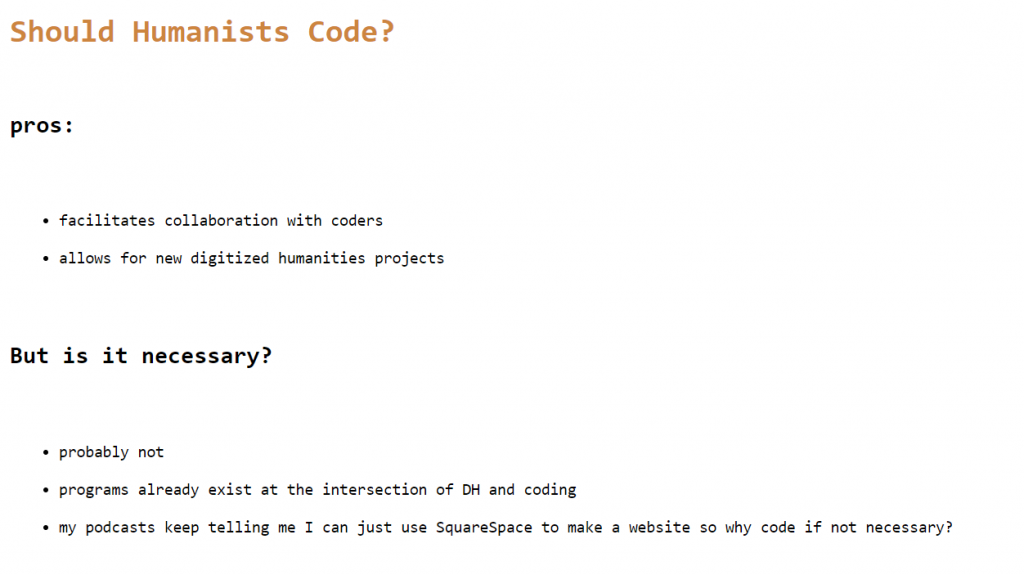Coding is our future. No matter how I try to work around that statement or spin it to find a counterargument, nothing can truly contest that fact. And it is a fact — not just in terms of our futures as members of the work force, but as members of a world whose various disciplines increasingly rely on coding to change the world. But when looking towards the future (and with it, towards computer science), how is the past (read: history and the humanities) involved? Can coding be used as a method to digitize and expand the study of humanities? Should it be? In my opinion, yes and no. I ultimately prescribe to the argument of Evan Donahue in his piece “A “Hello World” Apart (why humanities students should NOT learn to program),” in stating that while abundantly useful in any studies in our modern world, coding is not expressly necessary in order for humanities students to engage with computer science, and with it the future it proposes. Furthermore, I agree that firmly distinguishing between the humanities and the computer sciences not only generalizes each study but also counter-intuitively divides disciplines with the same fundamental thought processes behind them. In focusing on mastering them separately, it becomes harder to master them together.
… in many ways the two are working on exactly the same projects and the very idea that they are, a priori, separate and distinct bodies of knowledge may be the king hobgoblin of any attempts to create something that professes to be a digital humanities situated somewhere between the two.
Evan Donahue, A “Hello World” Apart (why humanities students should NOT learn to program)
While coding and computer science may prove to be a viable and productive outlet for manifesting and materializing digital humanities projects, a recognition of how computer science works and the junction between it and humanities. Digital humanities prides itself on sharing and cooperation. Rather than urging humanists to catch up with code, we should learn how humanists and coders can work together to produce significant works and projects relevant to both disciplines. In addition, when humanities and CS are delineated as two completely separate academic tracks, humanists may be less motivated to try to learn to code, fearing not only the complexity but the foreignness of the field (when in reality, as Donahue notes, they are not as far apart as some may think). There is definite value in knowing what code looks like; being able to recognize the jobs of coders and the product of certain lines of code are critical skills for collaboration between humanists and computer scientists. However, while knowing more about coding and being able to code would certainly serve as an asset, it is not a necessity, so long as humans retain the seemingly natural instinct to work together.
I will admit: I talk a big game for somebody whose coding expertise are limited to what I have learned in the past week. The only other moments that I have ever written code were on the National Coding Days throughout middle school, wherein I got to take a break from fractions to play Codingame during our math period. Perhaps my lack of experience jades my argument: I am definitely intimidated by coding and often appreciate the fact that my major interests will likely not require it. Nevertheless, my new practice with coding has engendered a significant appreciation for the skill within me, and has illuminated for me the relevance of coding in my own academic interests.
To let my code speak for me:

3 replies on “Should Humanities Students Learn to Code? Just Like JavaScript, It’s Complicated”
I agree that while coding is very useful, it should not be necessity if one wishes to engage in the digital humanities. Your point about the distinction between computer science and the humanities, how such a divide only ostracizes members of both groups, is definitely something that I have been thinking about after reading Donahue’s piece. It certainly seems like more progress would be made if coding was somehow more integrated or accessible to students regardless of their computer science background.
You make a very interesting point in the idea that Humanities scholars not knowing how to code encourages them to reach out and work with people in the computer science disciplines. I hadn’t thought about the idea that having Humanities scholars who can create entire projects themselves would isolate them from other disciplines and discourage the collaboration that is fundamental to the Digital Humanities.
“While knowing more about coding and being able to code would certainly serve as an asset, it is not a necessity, so long as humans retain the seemingly natural instinct to work together.”
I think your point as you make it here is where I tend to align myself in this “debate” about humanities scholars learning to code. It’s an asset, certainly, but with the emphasis on collaborative projects, an expertise in both humanities and CS isn’t necessary.